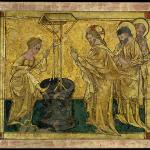 Today is the feast day of St. Thomas More, the patron saint of lawyers and politicians. More was that rarest of all creatures, an honest lawyer and politician. He also got his head cut off, which goes to show what that sort of thing will bring you.
Today is the feast day of St. Thomas More, the patron saint of lawyers and politicians. More was that rarest of all creatures, an honest lawyer and politician. He also got his head cut off, which goes to show what that sort of thing will bring you.
I’ve long thought that the example of St. Thomas More was, or at any rate ought to be, of particular relevance to judges. Under our system of government judges are called upon to settle legal disputes between different parties in accordance with the positive law applicable to the factual circumstances of the case. They are not, generally speaking, empowered to “do justice” on a case by case basis as they see fit.
In most cases, the result demanded by the law and the “just”* result will be the same. Occasionally, however, the two will differ. A legal technicality may require putting a clearly guilty and dangerous criminal back on the streets. A law or policy which seems reasonable enough may conflict with a constitutional provision or statute of higher authority, and thus under the law may be deemed void. A law which in general leads to the best result may, in a particular case, lead to an unfavorable one.
The temptation in such a case will be for the judge in question to ignore the law, substituting in its place his or her own views of what would be the best result. And certainly judges who fail to do this, who follow the law even where, to quote Dickens, the law is a ass, are often subject to scorn and ridicule. Following the example of St. Thomas More, however, ought I think lead a judge to resist this temptation. For judges take an oath to uphold the constitution and to decide cases in accordance with the positive law, and for them to do otherwise, even if it led to good results, would mean violating their oath. And as actions of St. Thomas More reaffirm, we may not do evil so that good may result.
We might, of course, think that a system in which judges are confined by the positive law is deficient, and that it would be better if judges were empowered to decide cases based on Solomonic justice. Personally, I am inclined to think that the system we have is better than the alternatives (if I wanted my disputes settled strictly in terms of morality and justice, I can think of a lot of people I would rather have decide the case than the current membership of the Supreme Court). But regardless of whether our system is ideal, it is our system, and the importance of the judge’s oath does not go away just because we wish things were different.
As we being the final week of the current Supreme Court term, in which several highly controversial decisions are likely to come down, we would all do well to keep the example of St. Thomas More in mind.
* I put “just” in quotes here because I think what justice ultimately demands from adjudication is a decision in accordance with the law.
















